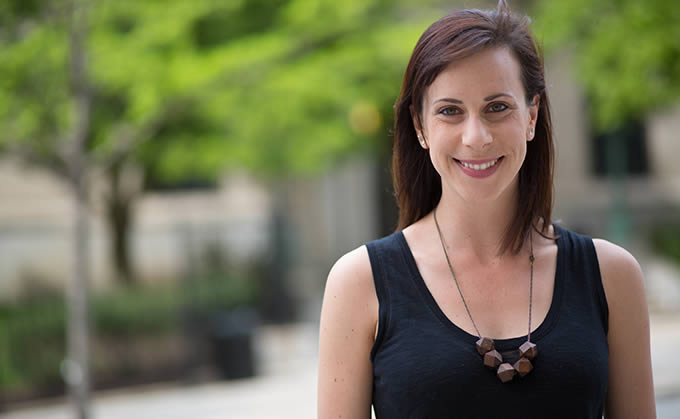Bloomberg School Student Awarded Fulbright-Fogarty Fellowship
Jessica Rothstein to examine what drives behavior change related to food hygiene.
Education, alone, cannot instill healthy habits such as handwashing with soap before food preparation, Jessica Rothstein, MSPH ‘14, says.
A PhD candidate in the Social and Behavioral Interventions program in International Health, Rothstein, 29, recently won a Fulbright-Fogarty Fellowship for her dissertation research to examine the “non-cognitive motivators” that drive behavior change for food hygiene in Oasis, a shantytown outside Lima, Peru.
Although poor hygiene is linked to diarrhea and stunting throughout the developing world, it is not enough to “tell moms to wash their hands and your kids will be healthier,” Rothstein contends. “Maybe soap is too expensive or maybe they have other understandings of what causes illness.”
Chronic malnutrition and diarrhea are common among children in Oasis, a settlement in the arid foothills of the Andes. Through household observation and in-depth interviews with caregivers, Rothstein seeks to pinpoint the behaviors that contribute to the contamination of “complementary foods” fed to babies during weaning. Because Oasis residents have minimal access to running water, sanitation and electricity, “what happens in households is extra important,” Rothstein insists.
Ultimately, Rothstein’s findings will inform behavior change messages and activities that promote handwashing, point-of-use water treatment and other practices aimed to prevent food-borne transmission of enteric infections.
Rothstein’s research rests within an ongoing cohort study looking at norovirus and sapovirus infection as a cause of diarrhea among children. The study is led by her mentor, Professor Robert Gilman, MD, who has spent decades researching infectious diseases in Peru. On a visit to Gilman’s field site last year, she proposed looking at behavioral determinants of WASH [water, sanitation and hygiene] issues. His response: “Yes, join the team.”
Rothstein’s qualitative research lends a fresh perspective to the ongoing investigation. “The more you understand about this,” Gilman says, “the more you can change practices or work on something to mitigate some of these risk factors.”
This is not the first time that Rothstein, who is fluent in Spanish, has found untapped opportunity within the scope of others’ projects. Her master’s research took root in the Peruvian Amazon, where Bloomberg School Assistant Professor Margaret Kosek, MD, was conducting research as part of a multi-site investigation of the relationship between malnutrition and enteric infections. Rothstein’s study focused on barriers encountered by caregivers to drinking water chlorination, an important infection prevention measure. Her findings were published last year in the American Journal of Tropical Medicine and Hygiene.
That master’s practicum marked a turning point in her life, Rothstein says. “That’s when I decided, ‘I think that I really, really like this.’ That’s when I decided to apply for the PhD.”
Earlier this year, Rothstein was awarded a Procter & Gamble Fellowship; established in 2003, the fund supports students committed to advancing the health and well-being of women and children through the provision of clean water and improved nutrition.
The prestigious fellowship she has just been awarded is made possible through a partnership between the Fulbright U.S. Student Program and the Fogarty International Center of the National Institutes of Health; it supports public health and clinical research in sub-Saharan Africa, Asia and Latin America.—Stephanie Shapiro

